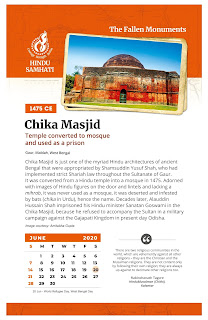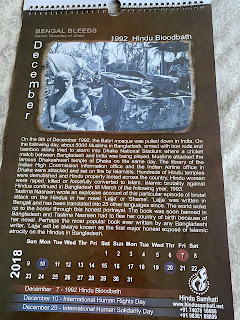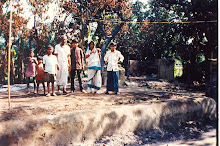Sri Tapan Ghosh
Fighter for Reclaiming West Bengal Identity
Sachi G. Dastidar
For Partition Documentation Project, New York
Mr. Tapan Ghosh, a noted political activist passed away in Kolkata on July 13, 2020, sadly through Corona Virus infection.
Mr. Tapan Ghosh was a pioneering in his political activism. Since partition of Bengal and India in 1947, politics of both Bengals took extremist bend. Eastern Bengal or East Bengal or East Pakistan or Bangladesh took an intolerant anti-Hindu Islamist bend with millions of Hindus killed over time, with tens of millions of Hindus fleeing for partitioned West Bengal State of India. While western Bengal or West Bengal increasingly became intolerant anti-Hindu Left, also called “communal communism” ruled by Communist Party of India-Marxist or CPM, yet almost all their leaders chose not to live in Muslim-majority East Pakistan or Bangladesh, for Hindu India which gave them shelter. (CPM massacred many Hindus, most notable of them were killing of Hindu monks and nuns in the heart of Kolkata https://empireslastcasualty. blogspot.com/2009/07/hindu-monks-and-nuns-killed-in-india-by.html, and killing of thousands of oppressed-caste Bangladeshi Hindu peasant refugees in Marichjhapi island in southern West Bengal https://empireslastcasualty.blogspot.com/2009/08/marichjhapi-west-bengal-india-communist.html. No one has been arrested for those killings, including during anti-Communist Trinamool Congress Party Government, 2010s.)
In West Bengal, India with the rise of communal Leftism – similar to racism of the West - from 1970s, and even earlier during Congress Party rule from 1947 through late 1970s, a tradition developed among Indian Bengali Hindus, including Hindu refugees who fled their Muslim majority nations of Pakistan and Bangladesh, of their identity, as not calling them Hindu, censoring anti-Hindu atrocities in Pakistan, Bangladesh and India, not teaching uncensored Indian history during colonial Islamic ruler and Islamic settler rulers from Central Asia, as well as during colonial British history, although anti-British history was not fully censored. They also stopped teaching ancient Indian/Hindu literature till 1800s in schools and colleges as they were “Hindu” literature as all the literature had to do with worshiping Mother Nature, plants and animals, to sun, moon and water, the six seasons, deities and more, as Hindus worshiped all of those and literature were enmeshed with those. This colonial mindset also affected millennia-old music, dance,
Surprising, a young man named Tapan Ghosh rose from that soil who openly identified himself as Hindu, and started talking of defending Hindu tradition and literature. This was something very new in 1960s through 2000s. Bengali elites termed such people as “communal” to hide their own communalism. To bridge the divide between Bengali Muslims and Hindus Mr. Ghosh made trips to Bangladesh as well and to Muslim-majority areas in West Bengal in India. In 2007 he formally developed Hindu Samhati, or Hindu Togetherness, a nationalist organization, which included all groups, to empower Hindus, especially Hindus in Hindu-majority West Bengal, India who feel oppressed by the state and elites. This is something risky in violence-ridden and censor-prone politics of West Bengal. He also opposed Neo-colonialism of the elites.
One of the taboos Hindu Samhati and Mr. Ghosh broke is to raise the censored issue of killing and destruction of Hindus and Hindu shrines in Bengal – West Bengal and Bangladesh – since non-native Islamic rulers invaded Bengal and started Islamic conversion. (This writer’s own 300-year old Kali Mandir of the Black Mother was destroyed during 1950s pogrom.) It is still a taboo, but Mr. Ghosh’s Hindu Samhati published politically-incorrect calendars documenting anti-Hindu atrocities in Bangladesh and West Bengal from earlier times till the present. Mr. Ghosh presented two of their calendars, 2018 and 2020, that document some of these atrocities to Partition Center. These are completely censored in history books of Bangladesh, West Bengal, India, America and the West, and by liberal and illiberal press.
In some ways his movement may be compared to Black Lives Matter movement in America, or Armenian Genocide remembrance movement among Armenians, or Jewish Holocaust remembrances in Europe of remembering their oppressive historical events, and give courage to victims.
Sri Ghosh visited Partition Center, and visited Partition Center volunteers in India.
Let us pray for his soul, as we say “He is resting in Mothers Bosom in the Heaven.” Om Shanti! Om Peace!
His last speech was on June 20, 2020 on Paschim Banga Dibas or West Bengal (Establishment) Day, at a virtual event. https://www.youtube.com/watch?v=bDLOdAvOrJ0 The lecture is in Bengali.
Here are pages from 2018 and 2020 calendars.
2020 Calendar
(The Calendar Highlights 12 Mosques Built after Destroying Hindu Mandirs [Temples])
April: 1992 Logang Massacre
May: 1971 Chuknagar Massacre
August: 1946 Great Calcutta Killing
September: 2012 Ramu Violence
October: 1946 Noakhali Genocide
November: 2001 Post Election Attacks
December: 1992 Hindu Bloodbath


































